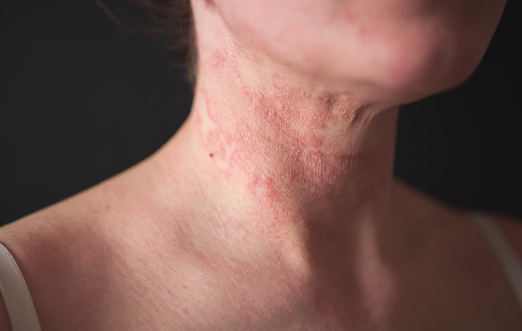Experiencing Eczema

Eczema, also known as dermatitis, results from a hyperactive immune response leading to red, itchy, inflamed skin. Eczema is uncomfortable and can make you self-conscious. If you live with eczema, learn more about it here. Then, consider visiting a board-certified dermatologist for help developing a skincare plan.
Types of Eczema
Many people aren’t aware that eczema isn’t a single skin condition but rather a group of conditions with similar triggers and symptoms. Here’s a look at some of them:
- Atopic dermatitis often begins in childhood and is one of the most common types of eczema.
- Contact dermatitis causes symptoms when you touch something you’re allergic to.
- Seborrheic dermatitis usually affects the scalp and face, causing scaly patches and dandruff.
- Dyshidrotic eczema causes tiny blisters on the hands and/or feet.
- Hand eczema makes the skin of your hands dry, thick, and scaly.
- Neurodermatitis is characterized by an itchy patch that develops on the arm, leg, back of the neck, scalp, or groin area.
- Nummular eczema appears as round, raised spots that can grow together to form large, slightly raised patches of skin.
- Statis dermatitis develops in people with poor blood flow, often manifesting near the ankles.
How to Prevent Eczema Flare-Ups
While eczema doesn’t have a cure, it’s possible to keep your symptoms under control with these tips:
- Avoid your triggers: Everything from cold temperatures and humidity changes to synthetic clothing fibers to stressful situations can trigger a flare-up. Work with a dermatologist to help pinpoint your eczema triggers so you can work to avoid them.
- Skip hot baths and showers: Excessive heat can dry out and irritate your sensitive skin, so avoid showering every day and use lukewarm water when you do.
- Keep your skin hydrated: Drink plenty of water and apply eczema-friendly lotion and moisturizer daily. In the winter, moisten the air with a humidifier.
- Apply preventative cream: Rather than using strong creams only when a rash develops, you can apply less potent medicine throughout the week to help prevent flare-ups before they start.
Find Relief from Eczema Flare-Ups
It’s important to start treating eczema as soon as symptoms appear to prevent the rash from worsening. A dermatologist can help you find the right therapeutic treatment for you, which may include:
- Cool compress: Applying a cool compress or soaking the affected area in water can provide relief.
- Topical creams: Over-the-counter options are available to control itching, dryness, and redness, such as hydrocortisone cream.
- Antihistamines: Certain topical or oral medicines may help control your body’s allergic response and minimize the resulting rash.
- Prescription medication: Your dermatologist may prescribe something stronger if OTC creams and antihistamines aren’t working.
If you’re struggling to find relief from eczema, please call Swinyer-Woseth Dermatology at (801) 682-4715 to speak with a board-certified dermatologist in Salt Lake City or South Jordan. Our team can help you pinpoint your triggers and recommend treatments when flare-ups occur.
